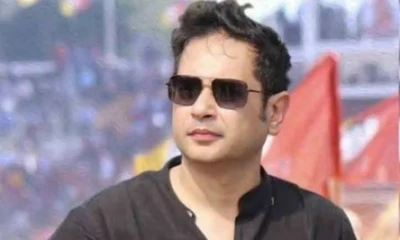Tripura’s Tipra Motha party chief Maharaja Pradyot Bikram Manikya Debbarma, who forged alliance with the BJP, aims to counter the CPI(M)-Congress coalition and has fielded his sister Kriti Singh Debbarma as the joint candidate for the Tripura East Lok Sabha seat.
The 45 years old articulate and charismatic royal scion grew up in Shillong where his family owns a huge property — the Tripura Castle — set amidst lush pine forests. Pradyot followed in his parents’ footsteps and joined the Congress soon after he returned to Tripura after his education in Shillong.
His father, Maharaja Kirit Bikram Kishore Debbarma was a three-time Congress MP and his mother Maharani Bibhu Devi was a Congress MP as well as an MLA and a minister in the then Congress Government in the State.
Affectionately known as Bubagra, Pradyot’s departure from the Congress stemmed from ideological differences, particularly over the National Register of Citizens or NRC issue, in 2019. Following that he remained inactive in politics for two years to form Tipra Motha to protect the political, cultural and land rights of the indigenous tribals of the State in 2021. The newly-formed party did exceptionally good in the elections to the Tripura Tribal Areas Autonomous District Council in April 2021, winning 16 of the 28 seats. In the 2023 Assembly elections, Tipra Motha emerged as the single largest Opposition party by winning 13 seats.
Despite his past affiliations with Opposition Congress, Pradyot expressed admiration for certain aspects of the BJP’s approach, highlighting the importance of learning from diverse political perspectives. His alliance with the BJP aligns with his broader agenda of securing the rights and identity of Tripura’s indigenous tribes.
Pradyot’s criticism of the CPI(M) runs deep, attributing the backwardness and poverty of tribals to the party’s policies. He condemned the CPI(M)’s destruction of tribal social fabric and cultural institutions like democratic village councils run by traditional chiefs. Instead, CPI(M) allowed mushrooming of clubs controlled by this party across the State. These abhorrent ‘club culture’ led to flourishing of anti-social and criminal elements, who became more powerful than heads of traditional institutions and subsequently, tribals lost their identity. However, Pradyot feels that these things can be undone in alliance with the BJP by working together for their restoration and preservation.
Regarding the demand for a separate Tipraland State, Pradyot envisions a future with greater and more meaningful autonomy for the tribals. This includes exploring options such as the creation of an ‘autonomous state’ under Article 244A of the Constitution or designating the tribal areas as a Union Territory, directly administered by the Central Government. He expressed the desire for direct oversight from the Central Government, citing concerns about being under the jurisdiction of the State Government.
Expounding on this perspective, Pradyot highlighted a strategic aspect. Given Tripura’s proximity to Bangladesh and the uncertain future of the neighbouring country after end of Sheikh Hasina’s leadership, there are apprehensions about the potential rise of Islamist radicals. Drawing parallels with the swift takeover by the Taliban in Afghanistan in 2021, he warned of the risk of a significant influx of refugees from Bangladesh into Tripura if such radical forces come to power. Pradyot highlighted the inadequacy of the State Government to handle such a scenario and advocated for the direct rule of the Centre over the tribal areas bordering Bangladesh.
Expressing his support for a model akin to Chandigarh (Union Territory) for the tribal areas of Tripura, Pradyot reiterated the primacy of national interest. He asserted, “We are Indians first, and it is imperative to prioritise actions that serve the best interests of the country.” Pradyot called upon the Indian Government to consider the establishment of a federally-administered territory comprising the tribal areas of Tripura as a proactive measure in safeguarding national security and stability.
Beyond politics, Pradyot aspire to lead a life of simplicity and service. He envisions transforming the Ujjayanta Palace into a museum, indicating hope and resilience, dedicated to shaping a brighter future for Tripura and its indigenous tribes.

















